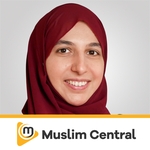Sarah Sultan – Trauma #00 – Introudction – Your Lord Has Not Forsaken You

AI: Summary ©
The speaker discusses their framework for trauma and how it helps to break down each chapter into a case study study. They also talk about their approach to healing and how it involves using the same approach as before. They mention their own experience with the approach and how it benefits their clinical perspective.
AI: Summary ©
In the introduction, we, you know, we started off by,
by talking about how normal trauma actually is right how common it is, and how a lot of people don't realize, you know, the vast number of people who've experienced trauma, and that they don't realize that what they personally have experienced could fall under the umbrella of trauma too. So kind of bringing that out there. And one of the main things that we talk about is our framework, right? Yes, which I totally love. And I don't know if anybody else has the same framework. So, you know, with trauma, first people were talking about just focusing on the mind, and then we went into a few decades of also focusing how it impacts the body, but there isn't still that connection to
spirituality, especially like Islamic, you know, Islamic psychology and, and that part, so for us to bring those two together and talk about how we break down each chapter, in terms of a case study exploring the unhealthy way of thinking, and then, you know, going into into the theory, and then the practical tips are meant to be, you know, Islamic, they're meant to help people focus on their mind, also, and the spiritual part as well. So that was one of the the major goals that we had is for it to be completely comprehensive and holistic, right, right, like looking at the person as a whole, right? That if you, you know, you change the mind, that helps to change the heart that helps
to impact the soul, but that the bodies have component in that as well. And we include like, adding a hadith like verse from the Quran and saying, so the prophesy celeb in each chapter to, to allow us to reflect them how they apply to, to our thought process and our journey and healing. And then one of the things that's really unique about our approach is we came up with the Doha, right, the Doha approach, measure, I was the one who thought of this in terms of applying sort of to Doha. And the way that Allah's pans out as talking to the Prophet Muhammad SAW Salam in this surah. And so and it's a very unique and really, I find it very, like an empowering and very validating approach, in
terms of when you consider the way Alesse pans out as talking to prophesy Salem. It validates us as like holistic people, right? And all the different parts of us that need to heal and need to be worked on as we go through a journey where we're struggling through something, right. Yeah. And I really like how simple it is, you know, when we look online, and you start to explore something psychology, it's the writing can be very dense. And you know, I'm, I've been a clinician for a long time you have been also reading it, it's very complicated. It's very, very hard to understand. And so I one day I was driving, I was like, No, Allah just show me an easy way for us to link psychology
and trauma. And then I was like, subhanAllah, like, sort of Doha is the perfect example. And it's so easy for people to understand, you know, and it, it really it hits trauma from a clinical perspective on all different levels. And so we are so happy for people to be able to see that throughout the series. Yeah. And again, it provides like that sense of validation, right? That, okay, if Allah subhanaw taala, is reinforcing these concepts for the Prophet Muhammad Hi, salam, as you know, in order to comfort him, then you walking into a clinicians office, are you picking up and you know, reading, reading these series of articles and everything, to work on healing yourself from
this fate framework? You You know that the intention is to bring you closer to Allah upon data. And when it's done through the framework of something that's based on the words of Allah subhanaw taala, then it makes you there's nothing better, right? There's there's no better approach than to use the approach that like the highest example is the one of LS pantalla. And to use that approach, we're really we're really excited about that and really honored that we that we could present that and hamdulillah